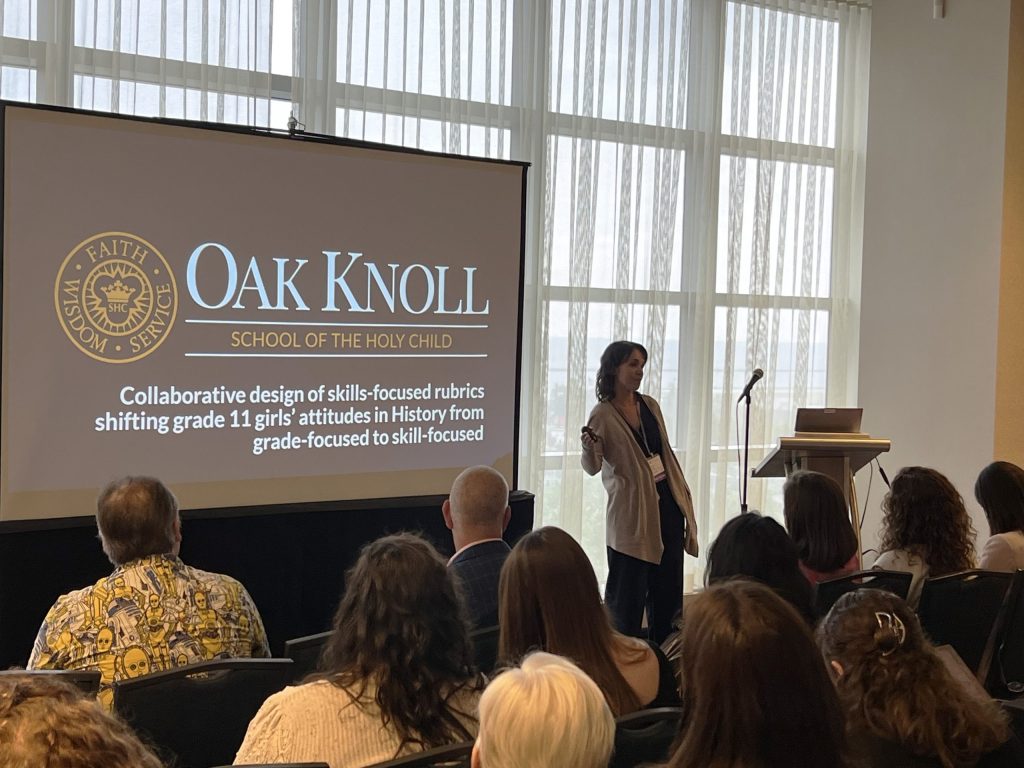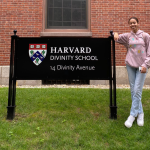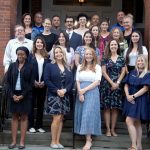OKS Voices: Nicole Johnston, Upper School History Teacher

Oak Knoll Upper School Teacher Nicole Johnston presents research results to International Coalition of Girls Schools
Nicole Johnston is in her 15th year teaching at Oak Knoll. We recently sat down with Ms. Johnston to learn about her journey to teaching history at Oak Knoll, her passion for government, and some trail-blazing research she recently completed regarding mastery-based learning and student-led rubrics.
Q: How did you get your start in teaching?
My journey to teaching came about after a brief stint working in politics. I started as a Political Science Major and worked as an intern with the Children’s Defense Fund and loved that. It made me realize my love for working with children and seeing children grow and flourish. I picked up Secondary Education as a major and maintained a lifelong interest in governmental issues and the US Constitution.
Q: What brought you from DC to New Jersey?
When I graduated, I worked briefly in DC at a private school and then moved back to New Jersey to be closer to family in New Providence where I grew up. I had always admired Oak Knoll’s all-girls approach to education, the high academic standards, and the connection to my own Catholic faith tradition, so I was thrilled to eventually join the history department and begin my career at Oak Knoll.
Q: Tell us a little more about your passion for government?
I am a self-proclaimed “government nerd.” I still stay connected to many college friends still working in politics and keep up on a host of issues related to US history and current events. I’m fascinated by the Declaration of Independence and the American Revolution and the foundation of our own government, and seeing how times change and how that changes the context within which the constitution is interpreted. Last summer, I started as a constitutional scholar for the National Constitution Center in Philadelphia.
Q: What is a constitutional scholar?
The National Constitution Center in Philadelphia has a teacher advisory council that I was invited to join. It is a cadre of individuals with constitutional backgrounds that meet once a month to recommend improvements to the center’s widely adopted school curriculum.
Q: You mentioned your own faith background. Do you sometimes have to balance personal beliefs with discussions of current events in the classroom?
In one of my first classes of the school year, with new students, I always start off by explaining that we are going to have hard conversations in my class. That’s how we learn. I tell students that I’m not going to teach them what to think, I’m going to teach them how to think so they can decide their own positions on various issues.
It’s our experiences that lead us to whatever beliefs we might have. And if we can engage in a conversation where we’re not trying to change someone’s opinion, but we’re trying to at least learn why they have that opinion, then those are the types of conversations I’m hoping to inspire.
My main priority as a teacher is to make sure I’m giving students the tools to be successful in their future. We are trying to develop students who are successfully able to understand and comprehend what’s happening in the world around them, and if I can encourage my students to be curious about the context of events, then I’ve done the right thing.
Q: In your experience over the years, how would you classify the typical Oak Knoll learner?
What I like about Oak Knoll students is the fact that they ask questions that aren’t just going to help them on the test. It’s not like, “Tell me what’s on the test.” It’s, “I’m really interested in what you’re talking about. Can we spend a few extra minutes on this?” Even though it might be of no relevance. And that’s really cool. Oak Knoll students are curious and really want to learn.
Q: Tell us about your recent research project and what you discovered?
I recently completed a fellowship with the Global Action Research Collaborative on Girls Education. I love research and learning. I am a dork. I always say, “If I ever won the lottery, I would just go to college for the rest of my life,” because I love learning.
My research involved student-created rubrics, mastery-based learning, and their effect on skills acquisition. I presented my results at a recent conference of the International Coalition of Girls Schools.
Most schools are very old fashioned in their approach to rubrics and how they relate to grades. The real goal should be how rubrics make successful students. A key focus of my research was determining whether student-created rubrics would lead to a better understanding of historical thinking skills. As evidenced through various student interviews and surveys, the collaborative development of the rubric and subsequent interventions led to a better understanding of skills.
Exploring skills-based learning led me to reflect on another important question in education: understanding the purpose of grading. As a young student, my goal was always to earn the highest grade, never understanding what those grades meant or whether years in the future I would be able to explain what I learned. This project has made me look deeper at the purpose of grading and the message or messages it sends to students.
Though longer-term analysis is underway, this year’s Oak Knoll AP History exam results, released by the College Board, are the best in five years and are significantly higher than the average results for both New Jersey as a whole and the global student average. I’m excited to see the results of my research here at Oak Knoll affecting other disciplines and classes in the future as well as other schools around the world.
Q: When you aren’t discussing the constitution, US history, government, and the Declaration of Independence, what do you enjoy doing?
I can be found on the pickleball court. I’m a member of the Oak Knoll faculty league — composed of past and present teachers — and I recently competed in the New Jersey state league. I’m in the process of writing an article entitled, “How Pickleball Can Save Democracy.”
Bio
Nicole Johnston attended American University in Washington, DC majoring in Political Science and Secondary Education. She has interned in Congress and maintained ties with many former college friends still working in and around politics. She has taught at the Newport School in Maryland, St. Rose in Short Hills, and at Oak Knoll for the last 15 years.






